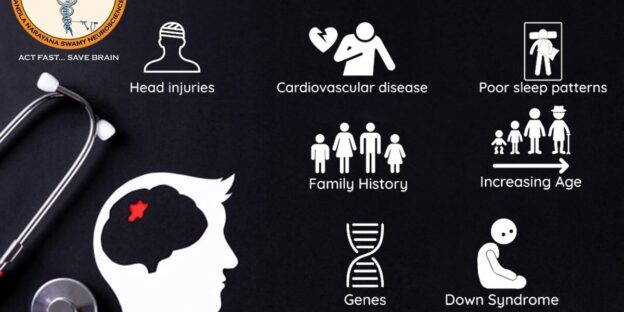Alzheimer’s disease: Symptoms, signs, diagnosis, and treatment
Alzheimer’s disease is a neurologic complication that results in your brain shrinking (atrophy) as well as the death of brain cells. Alzheimer’s is the most frequent form of dementia.
Forgetting current issues or discussions is one of the first indicators of Alzheimer’s disease. A person with the disease will acquire significant memory loss and lose the capacity to carry out daily duties as the disease develops.
Alzheimer’s disease has no cure or therapy that affects your brain. Complications from significant loss of brain function, such as dehydration, starvation, or infection, can lead to mortality in later stages of the condition.
If you are from Guntur and surrounding places and any of your family members is suffering from the symptoms of this disease, you should visit the best neurology hospital in Guntur. You will get the best cure over there.
Signs and Symptoms
A person with This disorder may initially notice that they are having trouble recalling things and organizing their thoughts. A friend or family member may note how the symptoms increase.
Recollection
Everyone suffers memory loss now and again, but Alzheimer’s disease causes memory loss that continues and worsens, impairing one’s ability to perform at work or home.
Alzheimer’s patients may:
- Over and over, repeat remarks and queries.
- Forget about discussions, appointments, or activities, and you won’t be able to recall them afterward.
- Misplacing goods regularly,
- Become disoriented in familiar surroundings.
- Gradually forgets the names of loved ones and commonplace items.
- Have problems identifying items, expressing thoughts, or participating in discussions because the patient doesn’t have the correct words.
Alzheimer’s disease disturbs concentration and reasoning, particularly regarding abstract notions like numbers.
Multitasking becomes very hard, and managing funds, using checkbooks, and paying payments on time can be challenging. A person with This disorder may eventually lose the ability to identify and cope with numbers.
Alzheimer’s disease impairs one’s capacity to make sound assessments and decisions in everyday settings. A person may, for example, make bad or unusual decisions in social encounters or dress inappropriately for the weather. It may be harder to respond efficiently to ordinary concerns such as a burning stove or unexpected driving scenarios.
As the condition develops, simple tasks that involve sequential processes, such as planning and making food or enjoying a favorite game, become more complex. People with severe Alzheimer’s disease frequently lose their ability to do simple tasks like clothing and washing.
Moods and behaviors can be affected due to Alzheimer’s disease
- Depression
- Indifference
- Withdrawal from social situations
- Swings in mood
- Others’ mistrust
- Aggressiveness and irritability
- Sleeping patterns have changed.
- Wandering.
- Lost inhibitions.
- Delusions, such as the belief that something has been stolen, are common.
So, how does your neurologist in Guntur make a diagnosis?
The diagnosis of Alzheimer’s is very much dependent upon the patient’s expression of the symptoms. Your doctor also performs memory and thinking ability tests to determine your disease diagnosis.
diagnosis of the disease includes
Examination of the physical and neurological systems
Your doctor will undertake a medical evaluation and will most likely evaluate the following to determine your general neurological health:
- Activeness of reflexes
- Tone and strength of muscles
- Your ability to stand up and walk independently
- Ability to see and listen
- Above everything, the coordination and balancing
Tests in the lab
Blood testing may rule out possible causes of memory loss and confusion, such as a thyroid condition or vitamin shortages.
Testing for mental health and neuropsychological issues
Your best neurosurgeon in Guntur may administer a quick mental status exam to examine your memory and other cognitive abilities. In comparison with persons of the same age group and education level, more extended kinds of neuroimaging studies may reveal more information regarding mental function.
Imaging of the brain
Imaging of the brain is mainly utilized to identify visual abnormalities associated with illnesses apart from Alzheimer’s disease. These might result in cognitive declines, such as strokes, trauma, or tumors. Doctors may detect particular brain abnormalities caused by Alzheimer’s disease using new imaging tools.
Now let us discuss the treatment available for Alzheimer’s disease:
Modern Alzheimer’s medications can temporarily treat memory issues and other cognitive abnormalities. Currently, two types of drugs are used to treat this disorder:
Cholinesterase inhibitors:
These medications function by conserving a chemical communicator diminished in the brain by Alzheimer’s disease, increasing cell-to-cell communication. Usually, your doctor begins to use this drug as the first medication. The majority of patients see minor improvements in their symptoms.
Memantine (Namenda):
This medicine works by slowing the symptoms in people suffering from moderate – to – severe Alzheimer’s disease. It is sometimes used with a cholinesterase inhibitor to get the best results. Side effects are very rare for these drugs. You may experience dizziness and confusion as to the adverse effects.

